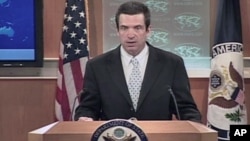The U.S. State Department said Thursday it has credible information that Iran is helping the Syrian government quell anti-government protests. Meanwhile a top U.S. diplomat is returning to Bahrain to try to ease a conflict between authorities and protestors there.
Iran has at least in public statements, praised protest movements in Arab countries. But officials here say that it is actively helping Syria in efforts to quell persistent demonstrations against the Damascus government.
The State Department comments follow a Wall Street Journal report Thursday quoting U.S. officials as saying that Iran is providing the government of Syrian President Bashar al-Assad with gear to suppress crowds, and assistance in blocking and monitoring protestors’ use of the Internet, cellphones and text-messaging.
The Iranian government used such tactics to violently put down a local protest movement last year, and the Wall Street Journal said its support for the al-Assad government reflects its concern about the prospect of losing a critical regional ally.
At a news briefing, State Department Acting Deputy Spokesman Mark Toner said while the Iranian government has “obvious problems” with its own human rights record, it continues to play a meddling role in the region.
“We believe that there is credible information that Iran is assisting Syria," said Toner. "I’m not going to get into details about that material assistance, but it’s of real concern to us.”
Toner said if the Syrian government, which has spoken of its interest in reform, is turning to Iran for help, it “can’t be very serious” about it.
As the same time, he called Iran’s encouragement of Arab protest movements, especially in Egypt and Bahrain, “hypocritical” though he said U.S. officials have not seen any indications that Iran is playing an “active role” in helping the mainly-Shiite Bahrain protest movement.
The spokesman said Assistant Secretary of State for Near Eastern Affairs Jeffrey Feltman will return to Bahrain next week to try to help bridge the gap between Manama government, a key U.S. ally, and opponents.
Feltman was in Bahrain last month trying to broker talks between the monarchy and protestors when the government launched a violent crackdown.
He was reportedly denied access to key government officials on the eve of the move by security forces, but Toner said the chief U.S. Middle east diplomat is confident he’ll be able to play a constructive role.
“We continue to have conversations with the Bahraini authorities and across the political spectrum in Bahrain," said Toner. "Certainly, we’ve been candid in voicing our concerns about some of these recent actions. But we believe that there is a peaceful way forward and that that can be achieved.”
Toner said the United States is concerned about Bahrain’s announcement Thursday that it will dissolve the country’s main Shiite opposition group, al-Wefaq, and a smaller faction on grounds that they had tried to bring down constitutional order.
He said the U.S. sees them as “legitimate” political societies that were recognized by the government and said Washington “would welcome” a reversal of the ban.
US Says Iran Helping Syria Quell Protests




